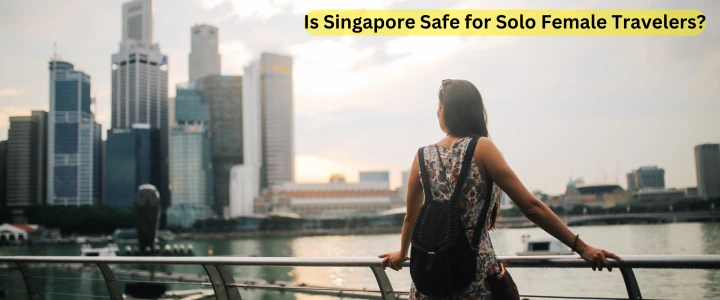Is Singapore Safe for Solo Female Travelers? That’s the question I asked myself when planning my trip to Singapore. As someone who has traveled solo to places like Belgium, Berlin, and the Maldives, I’ve learned that each destination brings its own set of challenges and joys. Belgium charmed me with its chocolate and history, Berlin captivated me with its vibrant culture, and the Maldives offered tranquil beaches perfect for reflection.
But Singapore was different—it was an exciting blend of cultures, modernity, and safety that I hadn’t experienced before. So, naturally, I wondered how safe it would be for a woman traveling alone.
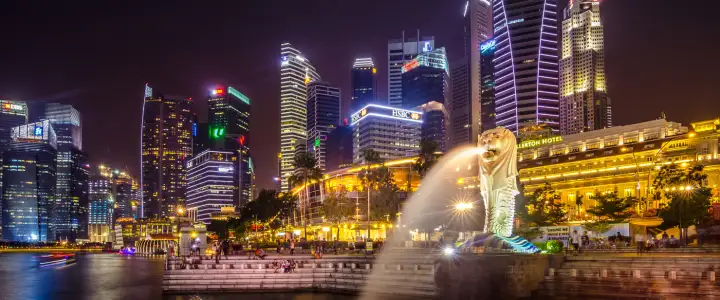
When I arrived in Singapore, my worries quickly faded. The city is clean, and organized, and has a strong reputation for being one of the safest cities in the world. From its efficient public transport to the friendly locals, everything about Singapore made me feel at ease. Walking around the streets, even at night, didn’t raise any alarms.
It’s not just about the crime rate, which is impressively low, but also about how comfortable and respected I felt as a solo female traveler. Singapore turned out to be not just safe, but incredibly welcoming, and in the next sections, I’ll share more about why this city should be on every solo female traveler’s list.
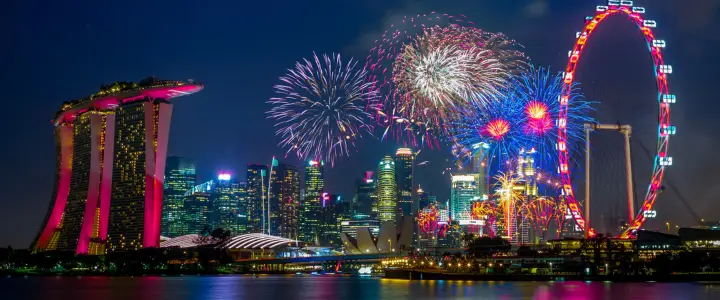
Table of Contents
Why Singapore is a Top Destination for Solo Female Travelers
Overview of Singapore’s Safety Record
When evaluating a city’s safety, especially as a solo female traveler, it’s crucial to look at the crime rate and overall security environment. Singapore is often hailed as a “safe city for women” and a prime example of effective governance in crime prevention.
- Low Crime Rate: Singapore has one of the lowest crime rates in the world, with violent crimes being extremely rare. In 2023, the overall crime rate remained low at 616 per 100,000 population, a testament to the country’s robust law enforcement and strict penalties for criminal activities.
- Strict Laws and Enforcement: Singapore is known for its stringent laws, covering everything from littering to drug offenses. These laws are strictly enforced, contributing to the overall sense of security within the city. For instance, public spaces are monitored by extensive surveillance systems, and police presence is high, especially in tourist areas.
- Global Rankings: Singapore consistently ranks in the top 10 of the Global Peace Index, reinforcing its reputation as a safe haven for travelers. According to the 2023 Safe Cities Index by the Economist Intelligence Unit, Singapore was ranked the 2nd safest city in the world, with particularly high scores in digital, health, infrastructure, and personal security.

Cultural Attitudes Towards Women
Understanding the cultural backdrop is key to feeling comfortable in a new place. Singapore is a multicultural society where respect for women is deeply ingrained in its social fabric.
- Respectful Society: Singaporean society places a high value on respect and dignity, regardless of gender. The country has made significant strides in gender equality, with women holding key positions in both government and business. This progress is reflected in the daily interactions you’ll experience—whether you’re asking for directions or dining out alone.
- Legal Protections: The government has implemented strong legal frameworks to protect women, including laws against harassment and workplace discrimination. For example, the Women’s Charter in Singapore provides comprehensive protection for women against domestic violence and harassment.
- Traveler Experiences: Many female travelers have reported feeling incredibly safe and welcomed in Singapore. As one traveler noted, “I felt safer walking around Singapore at night than I do in my own city during the day.” These sentiments are echoed by countless others, making it clear that Singapore is not just safe, but also hospitable to solo female explorers.
Public Transportation and Accessibility
Navigating a new city can be daunting, especially when traveling alone. Fortunately, Singapore’s public transportation system is one of the most efficient and safest in the world.
- MRT System: The Mass Rapid Transit (MRT) system in Singapore is clean, reliable, and well-lit, making it ideal for solo travelers. Trains are equipped with clear signage in multiple languages, and stations are monitored by security personnel. Additionally, the MRT runs late into the night, ensuring you can get back to your accommodation safely after a day of exploring.
- Buses and Taxis: Buses in Singapore are equally safe, with courteous drivers and clear route information. For added convenience and security, taxis are widely available and can be booked through reputable apps like Grab. The app also allows you to share your ride details with friends or family, adding an extra layer of safety.
- Ride-Sharing Services: Ride-sharing apps like Grab and Gojek are popular in Singapore and offer features like GPS tracking and contactless payments. These services are often used by solo travelers for the convenience and security they provide.
In summary, Singapore’s excellent safety record, respectful cultural attitudes, and accessible public transportation system make it an ideal destination for solo female travelers. Whether you’re exploring the city’s vibrant neighborhoods or enjoying its serene parks, you can do so with confidence and peace of mind.
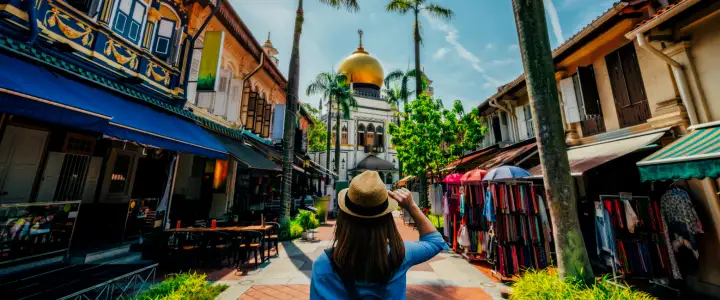
Potential Safety Concerns for Solo Female Travelers in Singapore
Common Concerns and How to Address Them
While Singapore is widely recognized as one of the safest cities for travelers, it’s natural to have concerns, especially when traveling solo. Let’s address some of the common worries:
- Pickpocketing and Petty Theft: Although the crime rate is low, pickpocketing can occur in crowded areas like Orchard Road or during large events. Travel tips include keeping your belongings secure, using anti-theft bags, and avoiding carrying large amounts of cash. Most thefts are opportunistic, so staying vigilant is key.
- Night Safety: Singapore is generally safe at night, even for solo female travelers. Neighborhoods like Marina Bay, Clarke Quay, and Chinatown are well-lit and busy with both locals and tourists. However, it’s always wise to avoid deserted areas after dark. If you’re planning a late-night outing, consider taking a taxi or using a ride-sharing app to get back to your accommodation.
- Harassment: Harassment is uncommon in Singapore, but it’s essential to know how to respond. The city has strict laws against harassment, including the Protection from Harassment Act (POHA), which protects against unwanted attention and offensive behavior. If you ever feel uncomfortable, head to a public area and contact the police if necessary. The emergency number in Singapore is 999.
Areas to Avoid (If Any)
Singapore is known for being safe across the board, but like any major city, there are areas where you might need to exercise more caution:
- Geylang: While Geylang is famous for its vibrant food scene, parts of it are known for nightlife and red-light activities. Although not necessarily dangerous, solo female travelers might prefer to visit during the day and stick to well-populated streets.
- Little India on Weekends: Little India is a cultural gem, but it can become extremely crowded on weekends, particularly on Sundays. The bustling atmosphere might feel overwhelming, especially if you’re navigating it alone.
When choosing accommodations, it’s best to research neighborhoods thoroughly. Opt for central locations like Orchard Road, Marina Bay, or Sentosa, where safety is a priority and amenities are plentiful.
Health and Medical Safety
Staying healthy while traveling is just as important as staying safe. Singapore is well-equipped to handle any medical emergencies, making it a secure choice for solo female travelers.
- Healthcare Access: Singapore boasts world-class healthcare facilities, with hospitals and clinics spread across the city. In case of an emergency, you’ll have access to both public hospitals like Singapore General Hospital and private facilities like Mount Elizabeth Hospital. English is widely spoken by healthcare professionals, which makes communication easier.
- Vaccinations and Health Precautions: There are no mandatory vaccinations required for entry into Singapore, but it’s advisable to ensure your routine vaccinations are up to date. For those traveling from regions with yellow fever, a certificate of vaccination is required. Singapore is free from major tropical diseases like malaria, but it’s wise to take standard precautions against mosquito bites.
- Food Safety and Tap Water: Singapore is renowned for its cleanliness, and food hygiene standards are strictly enforced. You can safely enjoy meals at hawker centers, restaurants, and cafes. Tap water is safe to drink, eliminating the need for bottled water. However, if you have a sensitive stomach, consider starting with more familiar foods before diving into the local cuisine.
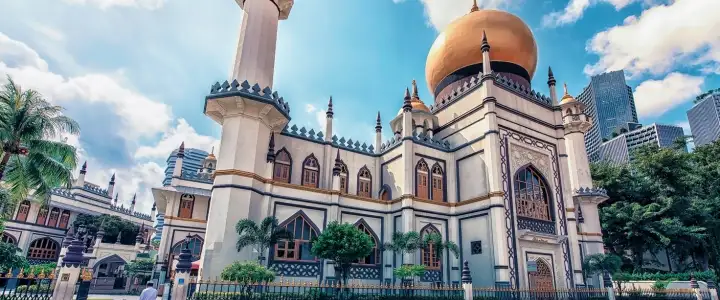
Potential Safety Concerns for Solo Female Travelers in Singapore
Common Concerns and How to Address Them
While Singapore is widely recognized as one of the safest cities for travelers, it’s natural to have concerns, especially when traveling solo. Let’s address some of the common worries:
- Pickpocketing and Petty Theft: Although the crime rate is low, pickpocketing can occur in crowded areas like Orchard Road or during large events. Travel tips include keeping your belongings secure, using anti-theft bags, and avoiding carrying large amounts of cash. Most thefts are opportunistic, so staying vigilant is key.
- Night Safety: Singapore is generally safe at night, even for solo female travelers. Neighborhoods like Marina Bay, Clarke Quay, and Chinatown are well-lit and busy with both locals and tourists. However, it’s always wise to avoid deserted areas after dark. If you’re planning a late-night outing, consider taking a taxi or using a ride-sharing app to get back to your accommodation.
- Harassment: Harassment is uncommon in Singapore, but it’s essential to know how to respond. The city has strict laws against harassment, including the Protection from Harassment Act (POHA), which protects against unwanted attention and offensive behavior. If you ever feel uncomfortable, head to a public area and contact the police if necessary. The emergency number in Singapore is 999.
Areas to Avoid (If Any)
Singapore is known for being safe across the board, but like any major city, there are areas where you might need to exercise more caution:
- Geylang: While Geylang is famous for its vibrant food scene, parts of it are known for nightlife and red-light activities. Although not necessarily dangerous, solo female travelers might prefer to visit during the day and stick to well-populated streets.
- Little India on Weekends: Little India is a cultural gem, but it can become extremely crowded on weekends, particularly on Sundays. The bustling atmosphere might feel overwhelming, especially if you’re navigating it alone.
When choosing accommodations, it’s best to research neighborhoods thoroughly. Opt for central locations like Orchard Road, Marina Bay, or Sentosa, where safety is a priority and amenities are plentiful.
Health and Medical Safety
Staying healthy while traveling is just as important as staying safe. Singapore is well-equipped to handle any medical emergencies, making it a secure choice for solo female travelers.
- Healthcare Access: Singapore boasts world-class healthcare facilities, with hospitals and clinics spread across the city. In case of an emergency, you’ll have access to both public hospitals like Singapore General Hospital and private facilities like Mount Elizabeth Hospital. English is widely spoken by healthcare professionals, which makes communication easier.
- Vaccinations and Health Precautions: There are no mandatory vaccinations required for entry into Singapore, but it’s advisable to ensure your routine vaccinations are up to date. For those traveling from regions with yellow fever, a certificate of vaccination is required. Singapore is free from major tropical diseases like malaria, but it’s wise to take standard precautions against mosquito bites.
- Food Safety and Tap Water: Singapore is renowned for its cleanliness, and food hygiene standards are strictly enforced. You can safely enjoy meals at hawker centers, restaurants, and cafes. Tap water is safe to drink, eliminating the need for bottled water. However, if you have a sensitive stomach, consider starting with more familiar foods before diving into the local cuisine.
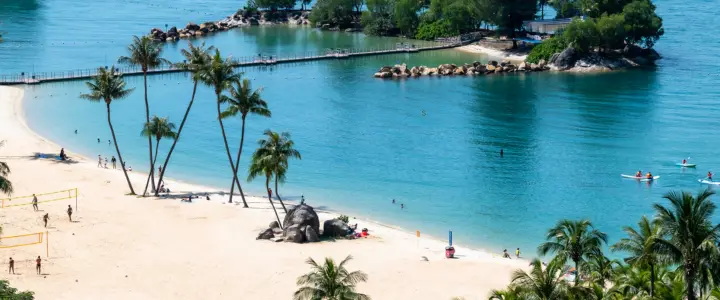
Tips for Solo Female Travelers in Singapore
Accommodation Safety Tips
Choosing the right accommodation can greatly impact your travel experience. Singapore offers a wide range of safe and comfortable options for solo female travelers.
- Hotels and Hostels: Singapore has numerous hotels and hostels that cater specifically to solo travelers. Look for accommodations with 24-hour security, female-only floors, and positive reviews from other solo female travelers. Travel tips for booking include checking platforms like Booking.com or TripAdvisor for highly-rated properties in safe, central locations.
- Airbnb and Homestays: If you prefer a more local experience, Airbnb offers plenty of safe and welcoming options. Always read reviews carefully and choose hosts with verified identities and a history of positive feedback. For added security, opt for entire apartments rather than shared spaces.
- Neighborhoods to Consider: Safe and popular areas for solo travelers include Orchard Road, Marina Bay, Bugis, and Sentosa Island. These areas are well-connected by public transport and are close to major attractions, shopping centers, and dining options.
Dressing Appropriately
Singapore’s diverse culture is generally tolerant, but understanding local customs can help you blend in and avoid unwanted attention.
- Cultural Norms: Singapore is a melting pot of cultures, including Malay, Chinese, Indian, and Western influences. While there isn’t a strict dress code, it’s important to dress modestly when visiting religious sites like temples and mosques. For example, covering your shoulders and knees is recommended in these settings.
- Dressing for Activities: Singapore’s climate is tropical, with high humidity and temperatures averaging between 77°F (25°C) and 88°F (31°C). Light, breathable fabrics are ideal. If you’re visiting temples or planning to enjoy the nightlife, consider bringing a scarf or shawl to cover up when needed. For daytime exploration, casual and comfortable attire like shorts, t-shirts, and sneakers are perfectly acceptable.
Staying Connected
Staying connected while traveling solo is crucial for both safety and convenience.
- Mobile SIM Cards and Data Plans: Upon arrival at Changi Airport, you can easily purchase a local SIM card from one of the kiosks. Popular providers include Singtel, StarHub, and M1. These SIM cards offer affordable data plans, ensuring you can use maps, messaging apps, and stay connected with loved ones. Alternatively, consider renting a portable Wi-Fi device if you prefer not to switch SIM cards.
- Emergency Contacts and Useful Apps: Before you head out, save important contacts in your phone, such as your accommodation, local embassy, and the emergency number (999). Download apps like Google Maps, Grab (for transportation), and WhatsApp for communication. Singapore’s official tourism app, Visit Singapore, provides valuable information and navigation help.
- Keeping in Touch: Regularly updating friends or family about your whereabouts adds a layer of security. Share your itinerary and check in at key points during your trip. Consider using features like WhatsApp’s live location sharing for real-time updates.
Making the Most of Your Trip
Singapore offers a wide array of activities and attractions perfect for solo exploration. Here’s how to make the most of your visit:
- Must-Visit Places: Iconic landmarks like Marina Bay Sands, Gardens by the Bay, and Sentosa Island should be at the top of your list. Each offers unique experiences, from panoramic city views to nature walks and theme parks.
- Local Experiences: Dive into Singapore’s rich culture by visiting neighborhoods like Chinatown, Little India, and Kampong Glam. Explore the vibrant street art, indulge in local cuisine at hawker centers, and visit traditional temples and mosques.
- Connecting with Other Travelers: If you’re looking to meet other solo travelers or locals, consider joining group tours or events. Websites like Meetup.com often have listings for social gatherings, walking tours, and cultural experiences. The city’s numerous cafes and co-working spaces also offer opportunities to meet like-minded people.
Potential Safety Concerns for Solo Female Travelers in Singapore
Common Concerns and How to Address Them
While Singapore is widely recognized as one of the safest cities for travelers, it’s natural to have concerns, especially when traveling solo. Let’s address some of the common worries:
- Pickpocketing and Petty Theft: Although the crime rate is low, pickpocketing can occur in crowded areas like Orchard Road or during large events. Travel tips include keeping your belongings secure, using anti-theft bags, and avoiding carrying large amounts of cash. Most thefts are opportunistic, so staying vigilant is key.
- Night Safety: Singapore is generally safe at night, even for solo female travelers. Neighborhoods like Marina Bay, Clarke Quay, and Chinatown are well-lit and busy with both locals and tourists. However, it’s always wise to avoid deserted areas after dark. If you’re planning a late-night outing, consider taking a taxi or using a ride-sharing app to get back to your accommodation.
- Harassment: Harassment is uncommon in Singapore, but it’s essential to know how to respond. The city has strict laws against harassment, including the Protection from Harassment Act (POHA), which protects against unwanted attention and offensive behavior. If you ever feel uncomfortable, head to a public area and contact the police if necessary. The emergency number in Singapore is 999.
Areas to Avoid (If Any)
Singapore is known for being safe across the board, but like any major city, there are areas where you might need to exercise more caution:
- Geylang: While Geylang is famous for its vibrant food scene, parts of it are known for nightlife and red-light activities. Although not necessarily dangerous, solo female travelers might prefer to visit during the day and stick to well-populated streets.
- Little India on Weekends: Little India is a cultural gem, but it can become extremely crowded on weekends, particularly on Sundays. The bustling atmosphere might feel overwhelming, especially if you’re navigating it alone.
When choosing accommodations, it’s best to research neighborhoods thoroughly. Opt for central locations like Orchard Road, Marina Bay, or Sentosa, where safety is a priority and amenities are plentiful.
Health and Medical Safety
Staying healthy while traveling is just as important as staying safe. Singapore is well-equipped to handle any medical emergencies, making it a secure choice for solo female travelers.
- Healthcare Access: Singapore boasts world-class healthcare facilities, with hospitals and clinics spread across the city. In case of an emergency, you’ll have access to both public hospitals like Singapore General Hospital and private facilities like Mount Elizabeth Hospital. English is widely spoken by healthcare professionals, which makes communication easier.
- Vaccinations and Health Precautions: There are no mandatory vaccinations required for entry into Singapore, but it’s advisable to ensure your routine vaccinations are up to date. For those traveling from regions with yellow fever, a certificate of vaccination is required. Singapore is free from major tropical diseases like malaria, but it’s wise to take standard precautions against mosquito bites.
- Food Safety and Tap Water: Singapore is renowned for its cleanliness, and food hygiene standards are strictly enforced. You can safely enjoy meals at hawker centers, restaurants, and cafes. Tap water is safe to drink, eliminating the need for bottled water. However, if you have a sensitive stomach, consider starting with more familiar foods before diving into the local cuisine.
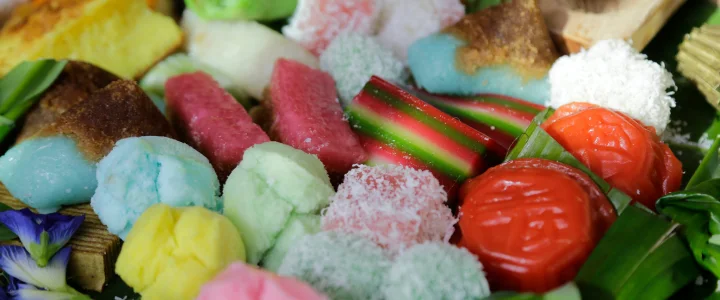
Tips for Solo Female Travelers in Singapore
Accommodation Safety Tips
Choosing the right accommodation can greatly impact your travel experience. Singapore offers a wide range of safe and comfortable options for solo female travelers.
- Hotels and Hostels: Singapore has numerous hotels and hostels that cater specifically to solo travelers. Look for accommodations with 24-hour security, female-only floors, and positive reviews from other solo female travelers. Travel tips for booking include checking platforms like Booking.com or TripAdvisor for highly-rated properties in safe, central locations.
- Airbnb and Homestays: If you prefer a more local experience, Airbnb offers plenty of safe and welcoming options. Always read reviews carefully and choose hosts with verified identities and a history of positive feedback. For added security, opt for entire apartments rather than shared spaces.
- Neighborhoods to Consider: Safe and popular areas for solo travelers include Orchard Road, Marina Bay, Bugis, and Sentosa Island. These areas are well-connected by public transport and are close to major attractions, shopping centers, and dining options.
Dressing Appropriately
Singapore’s diverse culture is generally tolerant, but understanding local customs can help you blend in and avoid unwanted attention.
- Cultural Norms: Singapore is a melting pot of cultures, including Malay, Chinese, Indian, and Western influences. While there isn’t a strict dress code, it’s important to dress modestly when visiting religious sites like temples and mosques. For example, covering your shoulders and knees is recommended in these settings.
- Dressing for Activities: Singapore’s climate is tropical, with high humidity and temperatures averaging between 77°F (25°C) and 88°F (31°C). Light, breathable fabrics are ideal. If you’re visiting temples or planning to enjoy the nightlife, consider bringing a scarf or shawl to cover up when needed. For daytime exploration, casual and comfortable attire like shorts, t-shirts, and sneakers are perfectly acceptable.
Staying Connected
Staying connected while traveling solo is crucial for both safety and convenience.
- Mobile SIM Cards and Data Plans: Upon arrival at Changi Airport, you can easily purchase a local SIM card from one of the kiosks. Popular providers include Singtel, StarHub, and M1. These SIM cards offer affordable data plans, ensuring you can use maps, messaging apps, and stay connected with loved ones. Alternatively, consider renting a portable Wi-Fi device if you prefer not to switch SIM cards.
- Emergency Contacts and Useful Apps: Before you head out, save important contacts in your phone, such as your accommodation, local embassy, and the emergency number (999). Download apps like Google Maps, Grab (for transportation), and WhatsApp for communication. Singapore’s official tourism app, Visit Singapore, provides valuable information and navigation help.
- Keeping in Touch: Regularly updating friends or family about your whereabouts adds a layer of security. Share your itinerary and check in at key points during your trip. Consider using features like WhatsApp’s live location sharing for real-time updates.
Making the Most of Your Trip
Singapore offers a wide array of activities and attractions perfect for solo exploration. Here’s how to make the most of your visit:
- Must-Visit Places: Iconic landmarks like Marina Bay Sands, Gardens by the Bay, and Sentosa Island should be at the top of your list. Each offers unique experiences, from panoramic city views to nature walks and theme parks.
- Local Experiences: Dive into Singapore’s rich culture by visiting neighborhoods like Chinatown, Little India, and Kampong Glam. Explore the vibrant street art, indulge in local cuisine at hawker centers, and visit traditional temples and mosques.
- Connecting with Other Travelers: If you’re looking to meet other solo travelers or locals, consider joining group tours or events. Websites like Meetup.com often have listings for social gatherings, walking tours, and cultural experiences. The city’s numerous cafes and co-working spaces also offer opportunities to meet like-minded people.
Stories from Solo Female Travelers in Singapore
Personal Experiences and Testimonials
Hearing from other solo female travelers can provide valuable insights and reassurance. Many women have shared positive experiences traveling alone in Singapore:
- Case Study 1: Maria, a 28-year-old traveler from Spain, spent two weeks exploring Singapore on her own. She highlighted the ease of getting around and the friendly locals who often offered help when she looked lost. “The MRT is so straightforward, and I never once felt unsafe, even when returning to my hotel late at night,” she shared.
- Case Study 2: Emma, a digital nomad from Australia, found Singapore to be a perfect blend of safety and excitement. She appreciated the numerous cafes where she could work during the day and the lively nightlife that was both safe and welcoming. “I was able to enjoy a night out at Clarke Quay without worrying about getting home safely. The ride-sharing apps here are a lifesaver,” she noted.
Lessons Learned: What They Wish They Knew Before Traveling
Even in a city as safe as Singapore, there are always tips and tricks that seasoned travelers wish they’d known beforehand:
- Packing Essentials: Many travelers suggest packing a light rain jacket or umbrella, as Singapore’s weather can be unpredictable with sudden tropical downpours. Comfortable walking shoes are also a must, given the amount of exploration on foot.
- Understanding Local Etiquette: While Singaporeans are generally open-minded, it’s important to understand local customs, particularly when it comes to dining etiquette and public behavior. For instance, chewing gum is banned in Singapore, and it’s illegal to eat or drink on the MRT.
- Budgeting Tips: Singapore is often considered an expensive city, but there are ways to save money. Opt for meals at hawker centers where you can enjoy authentic and delicious local food at a fraction of the price of a restaurant. Also, take advantage of free attractions like the Gardens by the Bay light show or the Marina Bay Sands boardwalk.
Conclusion: Is Singapore Safe for Solo Female Travelers?
To wrap up, Singapore stands out as one of the safest, most welcoming destinations for solo female travelers. With its low crime rate, respectful cultural attitudes, and exceptional public services, it’s no wonder that many women feel at ease exploring the city alone. Whether you’re wandering through the bustling streets of Chinatown, enjoying the lush greenery of the Botanic Gardens, or savoring a meal at a local hawker center, Singapore offers an experience that is both safe and enriching.
So, is Singapore safe for solo female travelers? Absolutely. With the right preparations and a sense of adventure, your solo journey to Singapore will not only be safe but also unforgettable. Enjoy the freedom to explore, knowing that Singapore has you covered every step of the way.
FAQs
Is Singapore safe for ladies?
Yes, Singapore is exceptionally safe for women. The city-state has a very low crime rate, and the government places a strong emphasis on public safety. Women, including solo female travelers, can explore the city comfortably, even at night, without much concern for their safety.
What is the safest country for solo female travelers?
While safety can depend on personal experiences, Singapore is often ranked among the safest countries for solo female travelers. Its efficient law enforcement, clean streets, and respectful culture make it an ideal destination for women traveling alone.
How safe is Singapore to travel alone?
Singapore is one of the safest countries in the world to travel alone. The city’s low crime rate, strict laws, and overall respect for public order ensure that solo travelers, including women, can explore with confidence.
Is it safe to walk in Singapore at midnight?
Yes, it is generally safe to walk in Singapore at midnight. The city is well-lit, and there is a noticeable presence of law enforcement, making late-night strolls in most areas safe for both locals and tourists.
Is Singapore safe for American tourists?
Absolutely, Singapore is very safe for American tourists. The city is welcoming to visitors from all over the world, and safety is a top priority. English is widely spoken, making it easy for American tourists to navigate and feel comfortable.
Is Singapore friendly to foreigners?
Yes, Singapore is very friendly to foreigners. The city is a melting pot of cultures, and its residents are accustomed to interacting with people from all over the world. As a foreigner, you’ll find the locals to be welcoming and helpful.
Is Singapore safe for solo female travelers at night?
Singapore is one of the safest cities for solo female travelers, even at night. Public transport is reliable and safe, and the city’s well-lit streets contribute to a secure environment, allowing solo female travelers to explore without worry.
Can a girl travel alone to Singapore?
Yes, a girl can definitely travel alone to Singapore. The city is extremely safe for solo female travelers, and there are plenty of attractions and activities designed to cater to solo adventurers.
Is Singapore expensive to visit?
Singapore can be more expensive compared to other Southeast Asian destinations, but it offers a range of accommodation, dining, and transportation options to suit different budgets. With careful planning, it’s possible to enjoy Singapore without breaking the bank.

